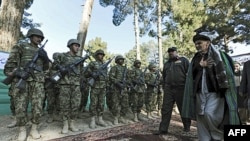Deputy U.S. Ambassador to the United Nations Rosemary DiCarlo said, “The United States is committed to backing Afghanistan and continuing [its] partnership through 2014 and beyond.” Despite the recent tragic events in Kandahar, the United States remains steadfast in its support of the mission in Afghanistan.
In the past few months, there has been significant progress in handing over security responsibilities to Afghan troops. Last November, Afghan President Hamid Karzai announced the second group of regions that will begin the transition to Afghan-led security. This includes five provinces in their entirety and various districts and cities in 13 other provinces. Now, approximately fifty percent of the Afghan population lives in areas that are transitioning to Afghan-led security.
Regional and international partners have helped solidify Afghanistan’s progress. The NATO summit to be held in Chicago in May will determine how the next phase in Afghanistan unfolds. Part of this phase will include NATO forces shifting to a support role in 2013, in advance of Afghanistan taking full responsibility for security in 2014.
Another important goal for Afghanistan is to halt the flow of opiates across its borders. Drugs fund terrorism and violence, block the emergence of legitimate livelihoods, and ruin lives. Freeing Afghanistan and its neighbors from the curse of drug addiction and economic dependence on this illicit trade is critical. On the ground today in Helmand province, the Afghan government is employing innovative programs that, with international support, have reduced poppy cultivation by 39 percent since 2008 within Helmand province. The eradication program sponsored by the Afghan Ministry of Counter Narcotics expanded into 18 provinces in 2011.
Across Afghanistan, the U.S. Agency for International Development has invested $541 million over the past three years in encouraging alternative livelihoods, including through agricultural and agribusiness training, agricultural credit, and promotion of high-value alternative crops. These programs serve over 300,000 rural households each year.
The United Nations plays an essential role in supporting the Afghan government and the Afghan people as they seek to establish full sovereign control of their country. That’s why the U.S. supports the extension of the United Nations Assistance Mission in Afghanistan for another 12 months.
As Afghans take responsibility for their own security, pursue reconciliation, and plan for a stable economic future, the United States will continue to stand by their side.
Progress in Afghanistan

Despite the recent tragic events in Kandahar, the United States remains steadfast in its support of the mission in Afghanistan.



